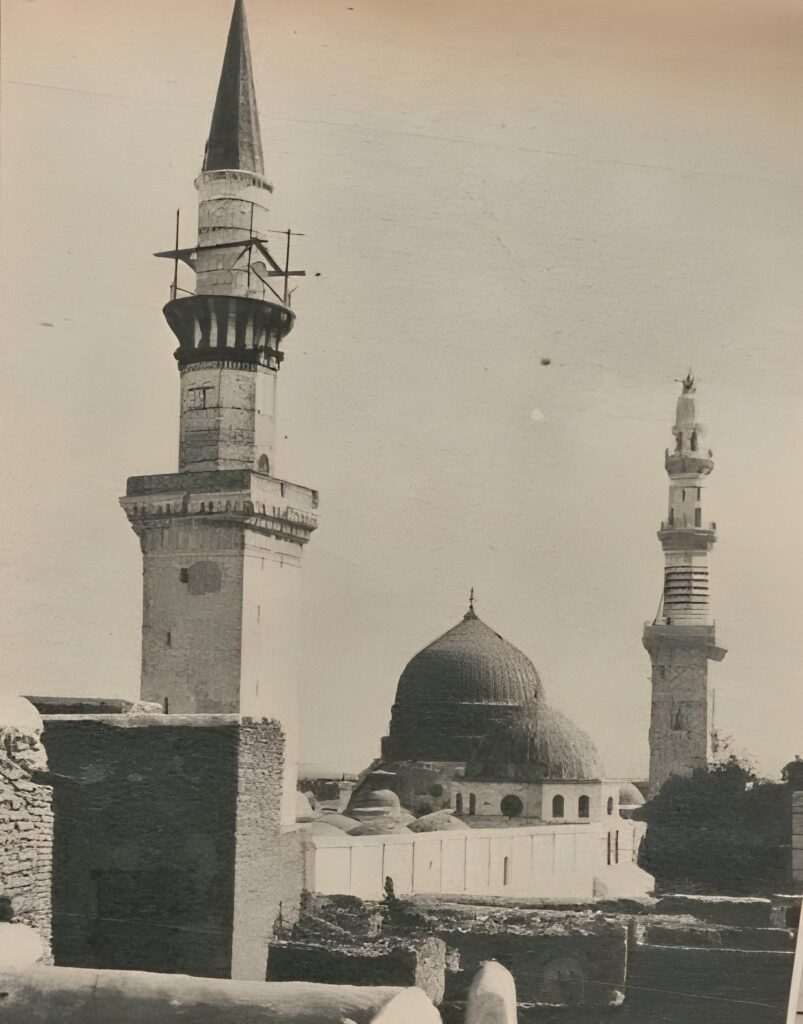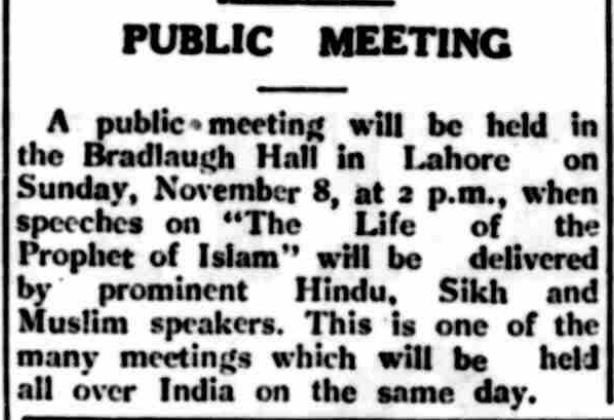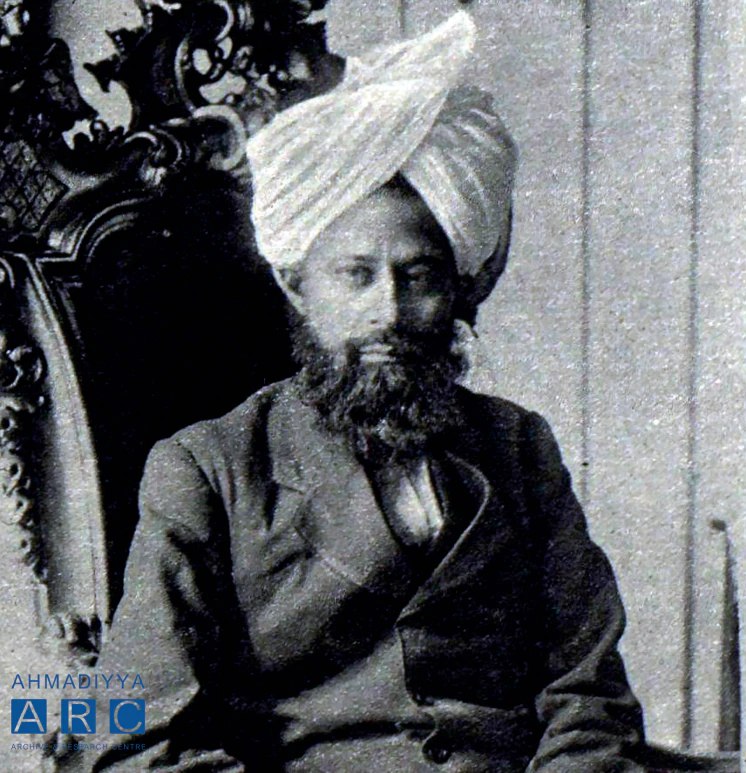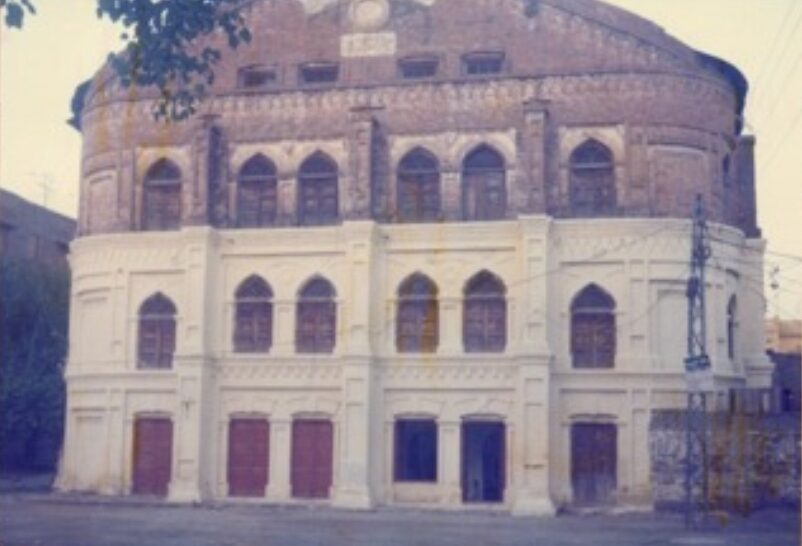Ata-ul-Haye Nasir, Al Hakam

In 1920s, the anti-Islam rhetoric was intensifying in British India. In response, Hazrat Musleh-e-Maud, Mirza Bashir-ud-Din Mahmud Ahmadra, initiated a grand scheme of holding Seerat-un-Nabi jalsas throughout the country. This scheme, launched in 1928, aimed to highlight the blessed character of the Holy Prophet Muhammadsa. Elaborating on this, Huzoorra stated:
“The reason why people dare to attack [the blessed character of the Holy Prophetsa] is that they are unaware of the true circumstances of his life. […] This has only one remedy, which is to deliver as many lectures as possible with such emphasis that every person of India should become aware of his purity and life’s circumstances. […] So it is our duty to make all the Muslims and non-Muslims of India aware of the pure life of the Holy Prophetsa. On the same day each year, this matter needs to be highlighted with special arrangement.” (Al Fazl, 10 January 1928, pp. 1-2)
The background and details of this initiative have already been narrated in our article, “Hazrat Musleh-e-Maud’s services to the Muslim cause: Guiding Muslims of the Indian subcontinent amid religious and political conflicts”, published on 26 February 2021.
Seerat-un-Nabi Jalsa in 1931
In 1931, Seerat-un-Nabi jalsas were held all over India on 8 November. One such jalsa took place at Bradlaugh Hall in Lahore, where Hazrat Musleh-e-Maudra delivered an address. It is noteworthy that Hazrat Musleh-e-Maudra had previously delivered several addresses at this venue, particularly on inter-faith harmony and world peace, including in 1919, 1920, 1923 and 1927.
Announcing this jalsa, The Civil and Military Gazette wrote:
“A public meeting will be held in the Bradlaugh Hall in Lahore on Sunday, November 8, at 2 p.m., when speeches on ‘The Life of the Prophet of Islam’ will be delivered by prominent Hindu, Sikh and Muslim speakers. This is one of the many meetings which will be held all over India on the same day.” (The Civil and Military Gazette, 8 November 1931, p. 7)

The session was presided over by Syed Abdul Qadir Sahib MA, professor of history at the Islamia College Lahore. After Hazrat Musleh-e-Maud’sra address, the president commended Huzoor’sra vast knowledge about Islam and the life of the Holy Prophetsa, stating that his address is a living proof of his love and devotion to the Holy Prophet Muhammadsa.
While the president was commending Huzoorra, some opponents of the Jamaat caused a disturbance and attempted to create disorder in the hall. In response, the president said:
“The progress of the Muslims is impossible as long as they comprise such evil and unwise people who cannot even refrain from opposing such a blessed gathering and such pure views.” (Al Fazl, 12 November 1931, p. 2)
Hazrat Musleh-e-Maud’sra address

At the beginning of his address, Hazrat Musleh-e-Maudra mentioned that he had not been feeling well for the past few days and was unsure whether he would be able to deliver an address on this blessed subject at the jalsa. Despite this, he deemed it essential to deliver a short speech and to discuss the objectives of the scheme he had initiated in 1928.
Huzoorra continued by presenting a method to eradicate the inter-religious tensions prevalent in British India at the time. This demonstrated his passion for establishing peace in society and fostering inter-faith harmony:
“I have been made subject to objections by various communities that I am the reason behind the many disorders which have emerged in the country. Everyone is free to hold any belief or view they wish and this is what Islam teaches. […] Thus, those who possess such a view have the right to retain it until they are satisfied otherwise. However, as they are free to make any view they wish in relation to my intentions, in the same way, I have also the right to act according to what I deem the truth.
“I have witnessed in the last few years that the inter-communal relations have worsened so much that the holy personages of each other’s religions are also being attacked. Consequently, on one hand, the religious relations are being tarnished, on the other, the worldly relations also get disconnected. I have pondered over this point as to whether there is any method which can improve these relations.
“The best way which I have found from the Islamic perspective is that such a scheme be initiated to request the people of other religions that ‘Is there any one among you who could narrate the good characteristics of our Master, Leader, Guide and in fact, the one who has ameliorated us spiritually and worldly [the Holy Prophet Muhammadsa] – though there are a few among you who only see flaws in him. If there is any such person, they should come to the stage and narrate those characteristics so that the Muslims are assured that while some people deem it their huge achievement to speak ill of the Holy Prophetsa, there are some others who value his blessed characteristics and services [to humanity at large].’ This method will minimise the rage and anger prevalent among the Muslims by seeing the other communities disrespecting our Mastersa, and consequently, the inter-communal relations will improve.
“This is the first step, and the other communities also hold the right to demand from us to narrate the blessed characteristics of their religious leaders, and I believe that the day is not far away when the followers of different communities would narrate the characteristics of each other’s religious founders on the same stage. If Hindus and Sikh will express good views about the Holy Prophetsa, the Muslims will also do the same about their religious founders, and this matter is not very difficult for the Muslims, since they have been taught that all previous prophets who came before the Holy Prophetsa, possessed great characteristics and that there is no nation which has been ignored by Allah the Almighty, but rather, He has sent Prophets in all nations.
“When many such jalsas will be held, the country’s situation will improve. […] I believe that there is no one who is unable to see any characteristic in the holy personages of others. […] Whichever religious scripture I read, I found certain attributes in them. […] Hence, it will be a very blessed day for India when the people will make a habit of seeing the good attributes of the other religions instead of finding their flaws.
“Some people object that I do not hold any right to initiate such a scheme, since [they believe that] I am not among the lovers of the Holy Prophetsa. I believe that those who attribute themselves to the Holy Prophetsa should never forget his saying: أَفَلَا شَقَقْتَ عَنْ قَلْبِهِ, meaning ‘Did you tear his heart open?’ [Sahih Muslim, Kitab al-Imaan, Hadith 96]. There can be no bigger oppression than to attribute something to a person which they do not even profess themselves.” (Nabi-e-Karimsa ke Paanch Azimush-shaan Ausaf, Anwar-ul-Ulum, Vol. 12, pp. 351-353)

Huzoorra then recited the following verse of the Holy Quran:
لَقَدۡ جَآءَکُمۡ رَسُوۡلٌ مِّنۡ اَنۡفُسِکُمۡ عَزِیۡزٌ عَلَیۡہِ مَا عَنِتُّمۡ حَرِیۡصٌ عَلَیۡکُمۡ بِالۡمُؤۡمِنِیۡنَ رَءُوۡفٌ رَّحِیۡمٌ
“Surely, a Messenger has come unto you from among yourselves; grievous to him is that you should fall into trouble; [he is] ardently desirous of your [welfare; and] to the believers [he is] compassionate, merciful.” (Surah at-Taubah, Ch. 9: V. 128)
Huzoorra commented that although this verse is short, it embodies five great qualities of the Holy Prophetsa. Firstly, God describes him as a Messenger. Secondly, as a Messenger raised “from among yourselves.” Thirdly, as one who finds it hard to bear the pain of others. Fourthly, as one who is supremely concerned for the welfare of humanity. And fifthly, as one who is compassionate and merciful to the believers. (Muhammad: The Kindred of Humanity, p. 1)
First characteristic
Huzoorra said that the first great quality of the Holy Prophetsa, mentioned in this verse, is that he is a messenger. The Arabic word رسول (rasul) means “the one who has been sent.” This single word rasul points to an aspect that many European writers have overlooked, leading to unfounded attacks on his life. This aspect is that, as a messenger, the Holy Prophetsa had no personal ambition for greatness or leadership. He did not seek admiration from others; instead, he ensured that any worldly greatness he received was solely what was bestowed upon him by Allah the Almighty.
Even before he claimed to be a prophet of God, he embodied all the qualities that define greatness in any human: truthfulness, courage, fortitude, sympathy, kindness, love, sociability, determination, quest for knowledge, and a passion for the people’s advancement. In short, he possessed all the admirable qualities found in any leader. These qualities alone, even without his role as a messenger, could have elevated him to a position of global leadership. Yet, he did not use these attributes for personal greatness. He had such extraordinary powers, yet he did not spend his time striving for political, intellectual or economic leadership, but in the contemplation of the true Beloved, in the solitude of the Cave Hira. The Holy Prophetsa never pursued personal success or individual greatness.
For a full forty years, he remained in the background. If after such a long wait, he did come to the forefront, it was due to a compulsion rather than an internal desire. As God said, “Surely, a Messenger has come unto you from among yourselves.” This means that when the Holy Prophetsa presents his revelations to his people, revealed by the Divine Being, it is not driven by personal ambition but by divine command. This attribute is found in all prophets, and thus, it should be understood that the Holy Prophet’ssa role as a messenger of God is consistent with this principle. Mosesas, Jesusas, Krishnaas, Buddhaas and Zoroasteras were all accepted by different people, acknowledging that these individuals came forward for the betterment of their people. Why should the same principle not be accepted for our Holy Prophetsa? (Ibid., pp. 1-3)
Second characteristic
Huzoorra continued, explaining that the second great quality mentioned in this verse is captured in the phrase: “From among yourselves.” This might seem like a simple attribute at first glance, but upon reflection, it turns out to be an attribute which serves to distinguish the Holy Prophetsa from the other leaders of the world. The purpose of all prophets’ advent is to lead their people to righteousness and serve as moral exemplars. It is obvious that a true exemplar must experience the urges and the constraints which all people have to experience, and confront the same conditions. This is why Christians believe that though Jesusas was the son of God, yet he came to the Israelites in human form. Similarly, the Hindus have been led to believe that the Avatars are incarnations of God come to us in human or other forms to serve as exemplars. This great attribute of the Holy Prophetsa has been emphasised in the words: “From among yourselves.” In another part of the Holy Quran, Allah the Almighty commands the Holy Prophet Muhammadsa to say: قُلۡ اِنَّمَاۤ اَنَا بَشَرٌ مِّثۡلُکُمۡ, meaning “Say, ‘I am only a man like yourselves.” (Surah al-Kahf, Ch. 18: V. 111) This indicates that the conditions faced by ordinary people have been fully represented in the life of the Prophet Muhammadsa, who guides as a perfect exemplar. In this respect the Holy Prophetsa surpasses all other prophets. There can be no denying, for instance, that Jesusas was a true and a great Prophet of God, but we cannot say that he was an exemplar to all times and people. However, the Holy Prophet Muhammadsa is one among ourselves. It seems as though God, in this verse, is addressing all of mankind and stating, “O my people whatever your calling, rank or position, there is none amongst you whose peculiar conditions have not been reproduced in one form or in another in the life of the Holy Prophet Muhammadsa. Whether you are a king or a subject, in authority or oppressed, married and are responsible for your children; or a labourer, farmer or trader, the messenger sent to you is from among you. None should think that Muhammadsa would not be aware of their unique challenges. Let not kings think that he would not know the difficulties and dangers kings have to face, nor let the oppressed think that he would not know what it is to suffer oppression. He has had the experience of all conditions of human life. He has had occasion to know first hand the difficulties of all classes of people; he has had the opportunity to appreciate the innermost feelings of all of them. Being rich in the experience and the vicissitudes of life, he offers himself as a guide to you all, and in respect of all the conditions that human beings have to live under.” (Ibid., pp. 4-5)
Huzoorra recounted incidents from the Holy Prophet’ssa childhood and early youth, noting that this early life was so pure that the most bigoted Western writers and Christian historians had to acknowledge it. (Ibid., pp. 7-8)
After this, Huzoorra narrated about the exemplary morals of the Holy Prophetsa and addressed the common objections raised by non-Muslims regarding his marriage to Hazrat Aishara.
Huzoorra continued, emphasising the Holy Prophet’ssa enduring patience under oppression. The Meccans would carry out all kinds of oppressions against him, however, whenever they stood in need, the Holy Prophetsa helped even his enemies ungrudgingly.
Huzoorra stated that the Holy Prophetsa was a judge who maintained the confidence of his people. As a commander, he taught humanity many lessons in the strategy and ethics of warfare. He preached without temper, and without the least bitterness in either word or deed. He would always hear the other side devotedly. Negotiating for peace, he would accept the humblest terms, and while fighting, he would display great bravery. The Holy Prophetsa was engaged in commerce as well. Here again, we know from the testimony of Hazrat Khadija’sra servant that nobody ever displayed such a high degree of honesty as he did. (Ibid., pp. 16-18)
Huzoorra further said that while these examples may inspire Muslim, however, they cannot satisfy a non-Muslim. Remember in this connection, the claim of the Holy Quran according to which all that is best and essential in the teachings of former prophets is embodied in the Holy Quran. The non-Muslims would then, whatever their denominations, regard Muhammadsa as one of their own, having rehabilitated as it were, in his own teaching, what was best teachings of former prophets. God Almighty taught him, and through him the entire world, as it states: وَاِنۡ مِّنۡ اُمَّۃٍ اِلَّا خَلَا فِیۡہَا نَذِیۡرٌ, meaning “And there is no people to whom a Warner has not been sent” (Surah Fatir, Ch. 35: V. 25). If all the different peoples of the earth have each had a warner, and all Prophets, as our Prophetsa has taught, are brethren, are we not justified in concluding that the Holy Prophet Muhammadsa is a brother to them all, a kinsman of theirs, including Ramaas, Krishnaas, Mosesas, Jesusas, Zoroasteras, and Confuciusas. All people, therefore, whether Indians, Persians, Egyptians, Japanese or Chinese can claim, as the Quranic verse has testified, that Muhammadsa the Messenger of Allah, is one of their own, as he has testified to the truth of the teachers of all nations much as the followers of these teachers testify to their truth. The Holy Prophetsa, therefore, is connected to all nations of the world. Every nation can regard him as their own. While the Holy Quran claims that the Holy Prophetsa is one of us, his life, in all its various bearings offers one continuous proof of this claim. (Ibid., pp. 20-21)

Third characteristic
Huzoorra continued by saying that the third excellence of our Prophetsa, highlighted in the Holy Quran, is found in the phrase “grievous to him is that you should fall into trouble.” At the advent of the Holy Prophetsa, three particular groups were especially oppressed: slaves, women and the Depressed Classes. He liberated and uplifted them all. And why not? “Grievous to him is that you should fall into trouble.” He could not possibly have tolerated the tyranny and torture to which these classes were being subjected, and did not rest until he had freed them all.. When killing of slaves was considered nothing heinous, he ordered that slaves who were mistreated should be set free. Further, the slaves were to be fed and clothed in the same manner as their masters and were not to be asked to do what the masters themselves would not do. If a master, for instance, would not engage in scavenging himself, he had no right to ask his slave to do it. Further the slaves were to be assisted in their duties. In this way the Prophetsa alleviated the miseries of slavery.
Then take the other class of the oppressed—the women. How pitiable was their plight! They were mistreated and divided as part of one’s inheritance, and in some cases, baby girls were buried alive. In short they were treated as a wretched and fallen lot. However, the Holy Prophetsa taught: خَيْرُكُمْ خَيْرُكُمْ لِأَهْلِهِ, meaning “The best among you is he who is best to his family,” and thus succeeded in correcting the wrongs from which women were suffering. He protected the interest of women by teaching that whosoever had two daughters and gave them proper education and good moral training, will have his abode in paradise. About mothers, he taught that not the slightest disrespect was to be shown to them.
The third class of people whom he liberated were those usually called the Depressed. It is stated in the Holy Quran: اِنَّ اَکۡرَمَکُمۡ عِنۡدَ اللّٰہِ اَتۡقٰکُمۡ, meaning “Verily, the most honourable among you, in the sight of Allah, is he who is the most righteous among you” (Surah al-Hujurat, Ch. 49: V. 14). In light of this, he taught that one should not consider themselves high and another as low. In the eyes of God, rank is determined by the level of one’s righteousness. How great and grand these words are. Simple, yet all at once they seem to raise the most depressed class to the highest level conceivable.
Then again, some people regard themselves superior to others. For instance, some Americans today seem to regard themselves as “Super Man”, and consider themselves to be better than the others. Islamic teaching in this relation is: لَا یَسۡخَرۡ قَوۡمٌ مِّنۡ قَوۡمٍ عَسٰۤی اَنۡ یَّکُوۡنُوۡا خَیۡرًا مِّنۡہُمۡ, meaning “Let not one people deride another people, who may be better than they” (Surah al-Hujurat, Ch. 49: V. 12) It is possible that tomorrow the advanced may come to a fall and the less advanced go forward. This has been so from the earliest times in this world. Therefore treat one another with respect. The Holy Prophetsa, to conclude, established a grand conception of humanity in the world. He liberated humanity from all its fundamental inequities, and this is just the claim which the Holy Quran has made for the Prophetsa: “Grievous to him is that you should fall into trouble.” (Ibid., pp. 22-25)
Fourth characteristic
Huzoorra further stated that the fourth excellence, pointed out in the verse, is contained in the words: “[He is] ardently desirous of your [welfare].” It is a most remarkable distinction of our Holy Prophetsa. A common failing amongst human leaders is to exaggerate their devotion to a single principle, ignoring whether it benefits or harms the people. The Holy Quran appropriately describes the Holy Prophet Muhammadsa as being primarily solicitous of us, our good and our welfare. The teaching of the Holy Prophetsa provides for the needs of all people in all conditions of life. It does not inculcate just one principle and adherence to just that principle. It teaches broad principles that can be adapted to varying situations and are primarily aimed at securing salvation for mankind. (Ibid., pp. 25-26)
Fifth characteristic
Huzoorra continued by saying that the fifth great quality of the Holy Prophetsa, pointed out in the verse, is contained in the words: “To the believers [he is] compassionate, merciful.” A common human failing, is that when a leader bestows benevolence upon the world or any particular group, they begin to expect recognition and gratitude from those indebted to them. They expect them to acknowledge what has been done for them. However, as the Holy Quran points out, the Holy Prophetsa is far above this human failing. Instead of expecting acknowledgement from those who he has benefitted, he himself feels grateful and indebted to them, and wants to serve them all the more. Being good to others, he feels as though it is they who are being good to him. He is thankful to others when others have more reason to be thankful to him. This is the very pinnacle of spiritual greatness, and only he can reach it who cares not for personal greatness, but rather, the one who is a messenger who stands up not on his own account but on account of the compelling message he receives from God Almighty. (Ibid., p. 27)
Towards the end, Huzoorra said:
“In conclusion, I wish to point out that disagreements can never be eradicated from the world, and as long as Muslims attempt to make peace by completely eliminating all disagreements, they will never succeed. Peace can only be established on the principle taught by the Holy Prophetsa, and that is to make peace despite the existence of disagreements.” (Nabi-e-Karimsa ke Paanch Azimush-shaan Ausaf, Anwar-ul-Ulum, Vol. 12, p. 372)
While advising the Muslims, Huzoorra said:
“Muslims are required to unite for their common goal [i.e. the propagation of Islam to all corners of the world], as this is the only pathway to success.” (Ibid.)

